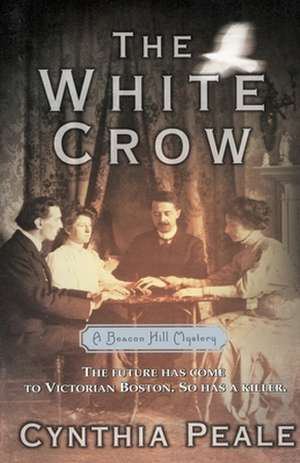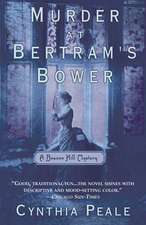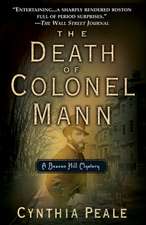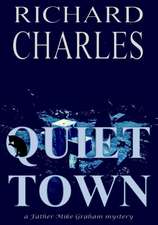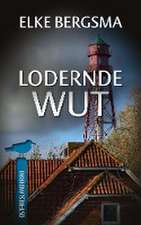The White Crow
Autor Cynthia Pealeen Limba Engleză Paperback – 3 mar 2003
When the lights come on after a séance in the parlor of Victorian Boston’s most celebrated spiritualist, a pillar of the community lies dead. The world of restless and vengeful spirits has invaded Beacon Hill--while Caroline Ames, seated next to the victim, may hold the key to an all-too-real crime.
From the mysterious device called the telephone to the new electric conveyances that cross the Charles, a tide of change is rising around Caroline, her brother, Addington, and their boarder, Dr. MacKenzie. For Caroline, it has been a time to face her loneliness--and the growing affection she feels for Dr. MacKenzie. For Addington, it is a time marked by the fierce, ineffable pull of a beautiful but dangerous woman. Now they find themselves in the center of a maelstrom, at the heart of a case of multiple murder. And while a killer has already claimed two victims, a clairvoyant has revealed the third: “Ames next...”
Preț: 115.73 lei
Nou
Puncte Express: 174
Preț estimativ în valută:
22.15€ • 24.07$ • 18.62£
22.15€ • 24.07$ • 18.62£
Carte disponibilă
Livrare economică 31 martie-14 aprilie
Preluare comenzi: 021 569.72.76
Specificații
ISBN-13: 9780440614197
ISBN-10: 0440614198
Pagini: 336
Dimensiuni: 140 x 216 x 19 mm
Greutate: 0.43 kg
Editura: dell
Colecția Dell
Locul publicării:United States
ISBN-10: 0440614198
Pagini: 336
Dimensiuni: 140 x 216 x 19 mm
Greutate: 0.43 kg
Editura: dell
Colecția Dell
Locul publicării:United States
Notă biografică
CYNTHIA PEALE is the pseudonym of Nancy Zaroulis, author of Call the Darkness Light and The Last Waltz, among other successful novels. She has written two previous Beacon Hill mysteries, The Death of Colonel Mann and Murder at Bertram’s Bower. She lives outside Boston.
From the Hardcover edition.
From the Hardcover edition.
Extras
Chapter 1
In a darkened room in a house on Lime Street, on the flat of Beacon Hill, Caroline Ames sat at a table clasping the hand of her friend, Dr. John Alexander MacKenzie, and tried to speak to her mother, who had been dead for a year and a half.
There were six other querants in the room. The medium, Mrs. Evangeline Sidgwick, was in deep trance. Her control, a temperamental entity named Roland, had spoken some minutes before in answer to a question--not Caroline's--but since then he had been silent for what seemed a very long time.
Caroline shifted in her chair. Her back itched just below her waistline, but her corset made the place impossible to scratch. The room was very warm--too warm, the windows closed and the curtains drawn against the bright May afternoon--and filled with a scent she could not identify: some heavy, musky odor that smelled the way she imagined incense might smell.
As if in answer to her movement, Dr. MacKenzie squeezed her hand. Impulsively she squeezed back. Improper, she knew, but she didn't care. Dr. MacKenzie, over these last months, had proved to be the best friend she'd ever had, and she realized she had grown perhaps too fond of him. What would she do if he decided to move on, to return to his position as a surgeon with the army in the West? Well, she would worry about that when it happened. For now--and particularly now, at this moment--he was here with her, and that was all that mattered.
It had been a daring thing to come here this afternoon. She'd had to swear Dr. MacKenzie to silence, make him promise not to tell Addington where they were going. Addington--her older brother, the guardian of her life--disapproved of mediums. Very probably he would have forbidden her to attend this seance today. In which case, she'd have had to engage in a deception even more blatant than the one she'd devised. We are going to walk in the Public Garden, she'd told him, such a lovely day, the first really good spring day we've had. He'd accepted it and gone about his business.
And now here she was, and after all her maneuvering, she'd failed. Her mother hadn't come through.
Dear Mama. Where was she? Was she happy? Busy about her work, up there in the ether or heaven or wherever she lived, now that she had passed over? Surely she'd gone to heaven, Caroline thought, where all good souls went.
She blinked back her sudden tears. Her mother's death had left a terrible emptiness in Caroline's life that hadn't eased until Dr. MacKenzie had come to board. She hadn't missed her mother so much these last months, and she knew that the doctor's presence in the Ames household was largely responsible for that.
But still, when the opportunity had presented itself to attend one of Mrs. Sidgwick's seances, she had been unable to resist. Mrs. Sidgwick was reputed to be the best medium in Boston, and Caroline had heard intriguing, even astonishing reports of her abilities to contact loved ones who had left the earthly plane. Meeting her for the first time today, she'd been surprised, for the medium was a small, modestly dressed woman, soft-spoken, even seeming rather shy, nothing about her to make one suspect she had such extraordinary powers.
But despite her powers, she--or, rather, her control, that irascible "Roland''--hadn't managed to reach the late Mrs. Ames.
Other spirits, yes. Many of the people there today had had the satisfaction of speaking to their loved ones. Before the seance had begun, they'd gathered in this room and gotten to know each other a bit. That nice Mrs. Ellis, for instance, an elderly widow who said she'd been trying for years to reach her son, killed at Gettysburg. He'd come through for her loud and clear, with fulsome assurances that he was doing splendidly, no pain, no sorrow, living in harmony with the hundreds--thousands--of other spirits like himself, no bodily ills, choirs of angels . . .
And Miss Price, a fortyish spinster here to contact her brother, who had died years ago when they were children. Miss Price was still weeping now--weeping from happiness, they all understood--a full half hour after Roland had relayed her brother's message. Essentially it had been the same message as that of Mrs. Ellis's son: a happy existence on that ethereal plane, no troubles.
And Mr. Theophilus Clay, poor man, here with his daughter, both of them trying to reach the late Mrs. Clay, who had died, Caroline knew, a very painful death.
Although "poor man" was hardly the way to describe Theophilus Clay, Caroline thought, since he was not only one of the wealthiest men in Boston but also one of the most generous and therefore loved, a liberal philanthropist widely known for his good works. So he was rich in friendship as well as money, and not to be pitied.
Still. All the money and all the friends in the world couldn't bring his wife back to him, could they?
He sat on Caroline's left. He'd clenched her hand tightly as he'd asked his questions and Mrs. Clay had answered them through Roland She'd told him her agony had ceased and she was happier now than she'd ever been.
The late Mrs. Clay's sister was there as well, but her questions had not been answered. Caroline had heard the woman's voice choked with tears as she put her queries to Roland, but for some reason Mrs. Clay's spirit had chosen not to respond.
Despite that disappointment as well as her own, Caroline had to admit that it had been a successful--amazingly successful--afternoon. Whoever Roland was, he was very knowledgeable. He transmitted information that Mrs. Sidgwick herself could not possibly have known. She could never have studied up on the family histories of everyone there today to prepare herself, as some mediums, fraudulent ones, were reputed to do.
That Mr. Jones, for instance, sitting on Mr. Clay's other side. He was a small, nondescript-looking man who had mumbled his queries as if he had a speech impediment. But Roland had understood him well enough and had answered him promptly. Perhaps Roland had mind-reading capabilities and didn't even need to hear the questions spoken out loud.
No, thought Caroline, despite Addington's scoffing at mediums and seances and making contact with the "other side," this exhibition today was genuine enough to make a believer out of anyone.
She tensed. Mr. Clay's daughter was asking another question.
"Is Grandmama with you in heaven, Mother?"
"Yes." Roland's voice, coming through Mrs. Sidgwick, was deep and rasping, very different from the medium's own.
"Is Grandmama there with you now?"
"Yes."
"Might I speak with her?"
"I am here." A different voice, higher. The voice of an older woman? A grandmama, in fact?
"Oh, Grandmama, I am so glad to speak to you!" cried Clay's daughter.
"Good works."
"You mean--what Papa does?"
"Laying up his treasures for heaven."
Caroline heard Mr. Clay clear his throat as if he were embarrassed at this praise. Was "Grandmama" his mother or his late wife's?
"Oh, Grandmama! How we miss you!"
Clay's daughter had married a young man-about-town, dashing and handsome--a bit of a rake, some people thought. She and her husband were among the young fashionables, with a magnificent new mansion on upper Commonwealth Avenue and a lavish lifestyle that was looked down on, Caroline knew, by some of the older, less affluent Boston families. But the girl was Clay's only child, and he had always indulged her freely. Her coming-out had been the most extravagant that Boston had ever seen, and now she and her husband entertained regularly and expensively and traveled widely, with apparently none of Clay's concern for doing good.
"Grandmama! Are you there?"
No answer.
"Mama! Mama! Don't go yet!"
Caroline heard the girl's voice break. For a moment there was silence in the room as they all strained to hear, but Roland apparently had nothing more to transmit.
Then she heard a new sound, like a pencil scribbling and scratching, papers shuffling. She looked in the direction of the sound, toward the medium, but in the darkness she couldn't see anything. Amazing, how on a bright, sunshiny afternoon this room was as black as a moonless midnight.
They make the room dark so as to deceive their credulous clients, Addington had said, his long, lean face drawn down into an expression of disdain. If you go there, you can expect to see a glowing phantom appear. It will be the medium's accomplice, shrouded in a sheet covered in luminescent paint. You can expect to hear weird music coming from afar. It will be another accomplice, hidden away in the medium's cabinet, playing a harmonica. It is all a cheap carnival trick, Caroline.
Well, he didn't need to know she'd come. This would be her secret--hers and Dr. MacKenzie's, whom she knew she could trust. And in any case, none of those things Addington predicted had happened. There had been no glowing phantom, no music. Too bad she wouldn't have the satisfaction of telling Addington that.
The scratching stopped. Her neighbor on her left, Theophilus Clay, started and made a sound like a grunt, as if something had bumped into him. He kept hold of her hand, however, so she assumed he was all right.
From the place where Mrs. Sidgwick sat, Caroline heard a low moan, as if the medium were in pain. And perhaps she was, Caroline thought; who knew how these mental voyages into the beyond strained the physical body?
Another moan, louder. Then the door opened and the maid appeared, as if that sound had been a signal. Moving briskly around the room, she turned up the gas and twitched back the heavy draperies. Caroline blinked as her eyes became accustomed to the light. All around the table people were shaking their heads, unclasping each other's hands.
With a small final pressure, Dr. MacKenzie removed his hand from hers.
"Are you all right?" he said in a low voice, smiling at her. She'd been disappointed not to contact her mother, he knew; he hoped she wouldn't take it too hard.
"Yes. I'm fine."
As she spoke, turning toward him, she flexed her left hand to release it from Mr. Clay's grasp.
Mr. Clay's hand didn't move.
She turned to look at him as she pulled hers away, shaking it a little. Mr. Clay's arm dropped and fell straight at his side.
And then, to her horror, he began to tilt toward her, his rather heavy torso threatening to fall onto her, and it would have done so if Dr. MacKenzie hadn't quickly risen and stepped around to straighten him.
"What is it, Doctor?" said Caroline, not caring if anyone overheard her. "Is he--what's wrong?"
MacKenzie was grappling with Mr. Clay, fumbling with his cuff to get at his pulse, with his shirt studs to reach his heart.
Across the table, Clay's daughter sprang to her feet.
"Papa!" she cried. "What is it? What is wrong?"
Dashing to her father's side, she pushed MacKenzie away as she slapped at Clay's face and squeezed his hands. The other people in the room, not realizing what had happened, stared at her in amazement.
"Papa!" She was screaming now, shrieking and sobbing. "Speak to me! Papa! Papa!"
But she was too late. Theophilus Clay, who had apparently been too greatly excited at contacting the spirit of his late wife, had gone over to the other side to join her.
Chapter 2
"He was dead, Addington! And I--I was holding his hand, and I never knew!"
It was evening, after a dinner Caroline had been unable to eat. She hadn't minded not eating; she was too plump as it was, and if she'd had the willpower, she would have fasted often. She reclined now in the parlor at No. 1612 Louisburg Square, her sweet, pretty face, ordinarily rosy with good health, still pale and drawn, her fair, curly hair escaping a little from its Psyche knot. Her feet were propped on the cricket before the fire. Ordinarily the Ameses stopped their hearth fires on the first of May every year, not starting them again until the end of September, but on this chilly night Ames had ordered that sea coal be brought and the parlor fire lit, as well as one in Caroline's bedroom.
Caroline had told him what happened at Mrs. Sidgwick's seance. She couldn't seem to stop telling it. Dr. MacKenzie hovered by her side, his broad, honest face a study in worry and concern. He was twisting the ends of his mustache--always, for him, a sign of distress. He longed to help her, but he didn't know how. Although he was a medical man, his entire experience had been with the army on the western plains; he knew very little about women, and nothing at all about their often mysterious vapors and swoons. And so now he could only stay by her, ready to offer brandy or sal volatile in case she fainted.
But to her credit she had not fainted--not here at home, nor at Mrs. Sidgwick's either. What a to-do that had been! In the immediate aftermath of the discovery that Theophilus Clay had died, old Mrs. Ellis had uttered a loud cry and had toppled from her chair, causing a little sideshow. Clay's daughter had carried on with her hysterics, shrieking and sobbing like a madwoman. But Caroline had been cool and clear-headed. She had gone at once to Mrs. Sidgwick, who, still weak from her exertions, had not at first understood what was happening. An ambulance, Caroline had said; we must send at once to the hospital.
Dr. MacKenzie had gently reminded her that the unfortunate Clay was beyond medical help; the police, he said, were surely the ones needed now?
Mrs. Sidgwick had a telephone. MacKenzie himself had placed the call; Caroline had heard him shouting in the front hall below. Clay's daughter had collapsed at her father's side while her aunt, Mrs. Briggs, tried to calm her. Mrs. Ellis had been cared for by Miss Price. Jones, the small, quiet man who mumbled, had moved from the table to sit by himself in a corner, his lips moving as if he were caught up in prayer.
Mrs. Sidgwick, after her first horrified reaction, had sat quite still, allowing Caroline to hold her hand but uttering no word. The maid who came in to open the curtains had retreated to the hall, where they could hear her sobbing.
"And then the police came?" Ames said now. He spoke gently, prompting her to go on because he understood that talking about it was helpful to her.
"Yes."
"But not Crippen?"
They were well acquainted with Deputy Chief Inspector Elwood Crippen, a fussy, officious little personage who got some things right but many wrong.
From the Hardcover edition.
In a darkened room in a house on Lime Street, on the flat of Beacon Hill, Caroline Ames sat at a table clasping the hand of her friend, Dr. John Alexander MacKenzie, and tried to speak to her mother, who had been dead for a year and a half.
There were six other querants in the room. The medium, Mrs. Evangeline Sidgwick, was in deep trance. Her control, a temperamental entity named Roland, had spoken some minutes before in answer to a question--not Caroline's--but since then he had been silent for what seemed a very long time.
Caroline shifted in her chair. Her back itched just below her waistline, but her corset made the place impossible to scratch. The room was very warm--too warm, the windows closed and the curtains drawn against the bright May afternoon--and filled with a scent she could not identify: some heavy, musky odor that smelled the way she imagined incense might smell.
As if in answer to her movement, Dr. MacKenzie squeezed her hand. Impulsively she squeezed back. Improper, she knew, but she didn't care. Dr. MacKenzie, over these last months, had proved to be the best friend she'd ever had, and she realized she had grown perhaps too fond of him. What would she do if he decided to move on, to return to his position as a surgeon with the army in the West? Well, she would worry about that when it happened. For now--and particularly now, at this moment--he was here with her, and that was all that mattered.
It had been a daring thing to come here this afternoon. She'd had to swear Dr. MacKenzie to silence, make him promise not to tell Addington where they were going. Addington--her older brother, the guardian of her life--disapproved of mediums. Very probably he would have forbidden her to attend this seance today. In which case, she'd have had to engage in a deception even more blatant than the one she'd devised. We are going to walk in the Public Garden, she'd told him, such a lovely day, the first really good spring day we've had. He'd accepted it and gone about his business.
And now here she was, and after all her maneuvering, she'd failed. Her mother hadn't come through.
Dear Mama. Where was she? Was she happy? Busy about her work, up there in the ether or heaven or wherever she lived, now that she had passed over? Surely she'd gone to heaven, Caroline thought, where all good souls went.
She blinked back her sudden tears. Her mother's death had left a terrible emptiness in Caroline's life that hadn't eased until Dr. MacKenzie had come to board. She hadn't missed her mother so much these last months, and she knew that the doctor's presence in the Ames household was largely responsible for that.
But still, when the opportunity had presented itself to attend one of Mrs. Sidgwick's seances, she had been unable to resist. Mrs. Sidgwick was reputed to be the best medium in Boston, and Caroline had heard intriguing, even astonishing reports of her abilities to contact loved ones who had left the earthly plane. Meeting her for the first time today, she'd been surprised, for the medium was a small, modestly dressed woman, soft-spoken, even seeming rather shy, nothing about her to make one suspect she had such extraordinary powers.
But despite her powers, she--or, rather, her control, that irascible "Roland''--hadn't managed to reach the late Mrs. Ames.
Other spirits, yes. Many of the people there today had had the satisfaction of speaking to their loved ones. Before the seance had begun, they'd gathered in this room and gotten to know each other a bit. That nice Mrs. Ellis, for instance, an elderly widow who said she'd been trying for years to reach her son, killed at Gettysburg. He'd come through for her loud and clear, with fulsome assurances that he was doing splendidly, no pain, no sorrow, living in harmony with the hundreds--thousands--of other spirits like himself, no bodily ills, choirs of angels . . .
And Miss Price, a fortyish spinster here to contact her brother, who had died years ago when they were children. Miss Price was still weeping now--weeping from happiness, they all understood--a full half hour after Roland had relayed her brother's message. Essentially it had been the same message as that of Mrs. Ellis's son: a happy existence on that ethereal plane, no troubles.
And Mr. Theophilus Clay, poor man, here with his daughter, both of them trying to reach the late Mrs. Clay, who had died, Caroline knew, a very painful death.
Although "poor man" was hardly the way to describe Theophilus Clay, Caroline thought, since he was not only one of the wealthiest men in Boston but also one of the most generous and therefore loved, a liberal philanthropist widely known for his good works. So he was rich in friendship as well as money, and not to be pitied.
Still. All the money and all the friends in the world couldn't bring his wife back to him, could they?
He sat on Caroline's left. He'd clenched her hand tightly as he'd asked his questions and Mrs. Clay had answered them through Roland She'd told him her agony had ceased and she was happier now than she'd ever been.
The late Mrs. Clay's sister was there as well, but her questions had not been answered. Caroline had heard the woman's voice choked with tears as she put her queries to Roland, but for some reason Mrs. Clay's spirit had chosen not to respond.
Despite that disappointment as well as her own, Caroline had to admit that it had been a successful--amazingly successful--afternoon. Whoever Roland was, he was very knowledgeable. He transmitted information that Mrs. Sidgwick herself could not possibly have known. She could never have studied up on the family histories of everyone there today to prepare herself, as some mediums, fraudulent ones, were reputed to do.
That Mr. Jones, for instance, sitting on Mr. Clay's other side. He was a small, nondescript-looking man who had mumbled his queries as if he had a speech impediment. But Roland had understood him well enough and had answered him promptly. Perhaps Roland had mind-reading capabilities and didn't even need to hear the questions spoken out loud.
No, thought Caroline, despite Addington's scoffing at mediums and seances and making contact with the "other side," this exhibition today was genuine enough to make a believer out of anyone.
She tensed. Mr. Clay's daughter was asking another question.
"Is Grandmama with you in heaven, Mother?"
"Yes." Roland's voice, coming through Mrs. Sidgwick, was deep and rasping, very different from the medium's own.
"Is Grandmama there with you now?"
"Yes."
"Might I speak with her?"
"I am here." A different voice, higher. The voice of an older woman? A grandmama, in fact?
"Oh, Grandmama, I am so glad to speak to you!" cried Clay's daughter.
"Good works."
"You mean--what Papa does?"
"Laying up his treasures for heaven."
Caroline heard Mr. Clay clear his throat as if he were embarrassed at this praise. Was "Grandmama" his mother or his late wife's?
"Oh, Grandmama! How we miss you!"
Clay's daughter had married a young man-about-town, dashing and handsome--a bit of a rake, some people thought. She and her husband were among the young fashionables, with a magnificent new mansion on upper Commonwealth Avenue and a lavish lifestyle that was looked down on, Caroline knew, by some of the older, less affluent Boston families. But the girl was Clay's only child, and he had always indulged her freely. Her coming-out had been the most extravagant that Boston had ever seen, and now she and her husband entertained regularly and expensively and traveled widely, with apparently none of Clay's concern for doing good.
"Grandmama! Are you there?"
No answer.
"Mama! Mama! Don't go yet!"
Caroline heard the girl's voice break. For a moment there was silence in the room as they all strained to hear, but Roland apparently had nothing more to transmit.
Then she heard a new sound, like a pencil scribbling and scratching, papers shuffling. She looked in the direction of the sound, toward the medium, but in the darkness she couldn't see anything. Amazing, how on a bright, sunshiny afternoon this room was as black as a moonless midnight.
They make the room dark so as to deceive their credulous clients, Addington had said, his long, lean face drawn down into an expression of disdain. If you go there, you can expect to see a glowing phantom appear. It will be the medium's accomplice, shrouded in a sheet covered in luminescent paint. You can expect to hear weird music coming from afar. It will be another accomplice, hidden away in the medium's cabinet, playing a harmonica. It is all a cheap carnival trick, Caroline.
Well, he didn't need to know she'd come. This would be her secret--hers and Dr. MacKenzie's, whom she knew she could trust. And in any case, none of those things Addington predicted had happened. There had been no glowing phantom, no music. Too bad she wouldn't have the satisfaction of telling Addington that.
The scratching stopped. Her neighbor on her left, Theophilus Clay, started and made a sound like a grunt, as if something had bumped into him. He kept hold of her hand, however, so she assumed he was all right.
From the place where Mrs. Sidgwick sat, Caroline heard a low moan, as if the medium were in pain. And perhaps she was, Caroline thought; who knew how these mental voyages into the beyond strained the physical body?
Another moan, louder. Then the door opened and the maid appeared, as if that sound had been a signal. Moving briskly around the room, she turned up the gas and twitched back the heavy draperies. Caroline blinked as her eyes became accustomed to the light. All around the table people were shaking their heads, unclasping each other's hands.
With a small final pressure, Dr. MacKenzie removed his hand from hers.
"Are you all right?" he said in a low voice, smiling at her. She'd been disappointed not to contact her mother, he knew; he hoped she wouldn't take it too hard.
"Yes. I'm fine."
As she spoke, turning toward him, she flexed her left hand to release it from Mr. Clay's grasp.
Mr. Clay's hand didn't move.
She turned to look at him as she pulled hers away, shaking it a little. Mr. Clay's arm dropped and fell straight at his side.
And then, to her horror, he began to tilt toward her, his rather heavy torso threatening to fall onto her, and it would have done so if Dr. MacKenzie hadn't quickly risen and stepped around to straighten him.
"What is it, Doctor?" said Caroline, not caring if anyone overheard her. "Is he--what's wrong?"
MacKenzie was grappling with Mr. Clay, fumbling with his cuff to get at his pulse, with his shirt studs to reach his heart.
Across the table, Clay's daughter sprang to her feet.
"Papa!" she cried. "What is it? What is wrong?"
Dashing to her father's side, she pushed MacKenzie away as she slapped at Clay's face and squeezed his hands. The other people in the room, not realizing what had happened, stared at her in amazement.
"Papa!" She was screaming now, shrieking and sobbing. "Speak to me! Papa! Papa!"
But she was too late. Theophilus Clay, who had apparently been too greatly excited at contacting the spirit of his late wife, had gone over to the other side to join her.
Chapter 2
"He was dead, Addington! And I--I was holding his hand, and I never knew!"
It was evening, after a dinner Caroline had been unable to eat. She hadn't minded not eating; she was too plump as it was, and if she'd had the willpower, she would have fasted often. She reclined now in the parlor at No. 1612 Louisburg Square, her sweet, pretty face, ordinarily rosy with good health, still pale and drawn, her fair, curly hair escaping a little from its Psyche knot. Her feet were propped on the cricket before the fire. Ordinarily the Ameses stopped their hearth fires on the first of May every year, not starting them again until the end of September, but on this chilly night Ames had ordered that sea coal be brought and the parlor fire lit, as well as one in Caroline's bedroom.
Caroline had told him what happened at Mrs. Sidgwick's seance. She couldn't seem to stop telling it. Dr. MacKenzie hovered by her side, his broad, honest face a study in worry and concern. He was twisting the ends of his mustache--always, for him, a sign of distress. He longed to help her, but he didn't know how. Although he was a medical man, his entire experience had been with the army on the western plains; he knew very little about women, and nothing at all about their often mysterious vapors and swoons. And so now he could only stay by her, ready to offer brandy or sal volatile in case she fainted.
But to her credit she had not fainted--not here at home, nor at Mrs. Sidgwick's either. What a to-do that had been! In the immediate aftermath of the discovery that Theophilus Clay had died, old Mrs. Ellis had uttered a loud cry and had toppled from her chair, causing a little sideshow. Clay's daughter had carried on with her hysterics, shrieking and sobbing like a madwoman. But Caroline had been cool and clear-headed. She had gone at once to Mrs. Sidgwick, who, still weak from her exertions, had not at first understood what was happening. An ambulance, Caroline had said; we must send at once to the hospital.
Dr. MacKenzie had gently reminded her that the unfortunate Clay was beyond medical help; the police, he said, were surely the ones needed now?
Mrs. Sidgwick had a telephone. MacKenzie himself had placed the call; Caroline had heard him shouting in the front hall below. Clay's daughter had collapsed at her father's side while her aunt, Mrs. Briggs, tried to calm her. Mrs. Ellis had been cared for by Miss Price. Jones, the small, quiet man who mumbled, had moved from the table to sit by himself in a corner, his lips moving as if he were caught up in prayer.
Mrs. Sidgwick, after her first horrified reaction, had sat quite still, allowing Caroline to hold her hand but uttering no word. The maid who came in to open the curtains had retreated to the hall, where they could hear her sobbing.
"And then the police came?" Ames said now. He spoke gently, prompting her to go on because he understood that talking about it was helpful to her.
"Yes."
"But not Crippen?"
They were well acquainted with Deputy Chief Inspector Elwood Crippen, a fussy, officious little personage who got some things right but many wrong.
From the Hardcover edition.
Recenzii
“How can you resist a story that combines seances, Victorian scandal, and the Barnum & Bailey Circus? A genteel adventure that offers readers suspense, romance, and an intriguing blend of factual and fictional characters...Highly enjoyable.”
--The Washington Post
“A riveting tale of murder and intrigue.”
--Forecast
--The Washington Post
“A riveting tale of murder and intrigue.”
--Forecast
Descriere
When a pillar of Victorian Boston is found dead following a sance held at thehome of a most celebrated spiritualist, Caroline Ames, who was seated next tothe victim, may hold the key to the crime.
